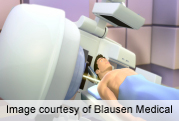
TUESDAY, June 26 (HealthDay News) — Limited radiation therapy was associated with high rates of two-year, event-free survival in children with favorable-risk Hodgkin lymphoma who had a complete response to chemotherapy, a new study shows.
More than 90 percent of children with favorable-risk Hodgkin lymphoma are long-term survivors. Research has shown, however, that these patients have elevated death rates more than 10 years after their diagnosis due to long-term toxic effects of their treatment, particularly radiation, said Dr. Monika Metzger, of St. Jude Children’s Research Hospital in Memphis, Tenn., and colleagues.
To reduce the long-term risk of complications, doctors use response-based therapies tailored to patients based on their early initial response to treatment. This approach seeks to identify patients who can safely receive lower levels of radiation.
In this study, Metzger and colleagues looked at 47 patients who had a complete response to chemotherapy and did not receive radiation, and 41 patients who had a less-than-complete response to chemotherapy and received limited radiation treatment.
The two-year event-free survival rate was 89.4 percent for patients who did not receive radiation and 92.5 percent for those who received limited radiation. The five-year event-free survival rates were 89.4 percent and 87.5 percent, respectively.
The study was published in the June 27 issue of the Journal of the American Medical Association.
The findings “highlight the continued commitment to reduce complications in the treatment of childhood malignancies and add to the growing body of evidence detailing the utility of early-response-adapted therapy,” Dr. Kimberly Whelan and Dr. Frederick Goldman, of the University of Alabama at Birmingham, wrote in an accompanying editorial.
More information
The U.S. National Cancer Institute has more about childhood Hodgkin lymphoma.

